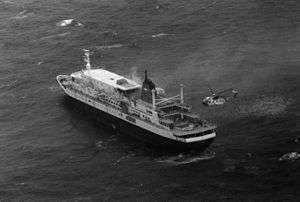MS Prinsendam (1973)
 MS Prinsendam on fire off Alaska, 1980 | |
| History | |
|---|---|
| Name: | Prinsendam |
| Operator: | Holland America Line |
| Builder: | De Merwede in Hardinxveld-Giessendam, Netherlands |
| Cost: | US$27 million |
| In service: | 1973 |
| Out of service: | October 4, 1980 |
| Fate: | Sank on October 11, 1980, in the Gulf of Alaska |
| General characteristics | |
| Length: | 427 ft (130 m) |
| Capacity: | 350 passengers |
| Crew: | 200 |
MS Prinsendam, a Holland-America liner built at Shipyard de Merwede in the Netherlands in 1973, was 427 feet long and typically carried about 350 passengers and 200 crew members. The liner was sailing through the Gulf of Alaska, approximately 120 miles south of Yakutat, Alaska, at midnight on October 4, 1980, when a fire broke out in the engine room. The vessel’s master, Cornelis Dirk Wabeke (April 13, 1928 – August 16, 2011), declared the fire out of control one hour later and the Prinsendam sent a radio call requesting immediate assistance. The United States Coast Guard at Communications Station Kodiak, Alaska requested that the Prinsendam send out an SOS, but the captain declined. Chief Radio Officer Jack van der Zee sent one out anyway about a half-hour later, which alerted nearby vessels.[1]
United States Coast Guard, USAF Air Rescue Service, and Royal Canadian Air Force CH113 helicopters which had greater range, rescued the passengers and crew. Two USAF pararescuemen were inserted into one of the lifeboats. This boat was the last rescued and was spotted only when the Air Force personnel signalled the on scene cutters. The cutters USCGC Boutwell (WHEC-719), USCGC Mellon (WHEC-717), and USCGC Woodrush (WLB-407) responded in concert with other vessels in the area. The Sohio Intrepid and the Williamsburg assisted on scene. The Williamsburg served a vital role as a communications platform and was the first vessel to arrive on scene and take passengers on board. The Sohio Intrepid served as a platform for one of the USAF helicopters that was unable to refuel in flight. The rescue took place during a period of steadily deteriorating weather. The passenger vessel capsized and sank a week later. The rescue is particularly noteworthy because of the distance traveled by the rescuers, the coordination of independent organizations, and the fact that all 520 passengers and crew were rescued without loss of life or serious injury.[2]
References
- ↑ Manuscript log of supertanker Williamsburg. 4 October 1980, retrieved May 31, 2008, http://www.qsl.net/n1ea/
- ↑ "USCG Top 10 Rescues". USCG. 2010. Retrieved 2010-12-17.
External links
- James Kelly, "A Morning to Remember", Time, October 20, 1980.
Coordinates: 55°52′59″N 136°27′00″W / 55.883°N 136.450°W